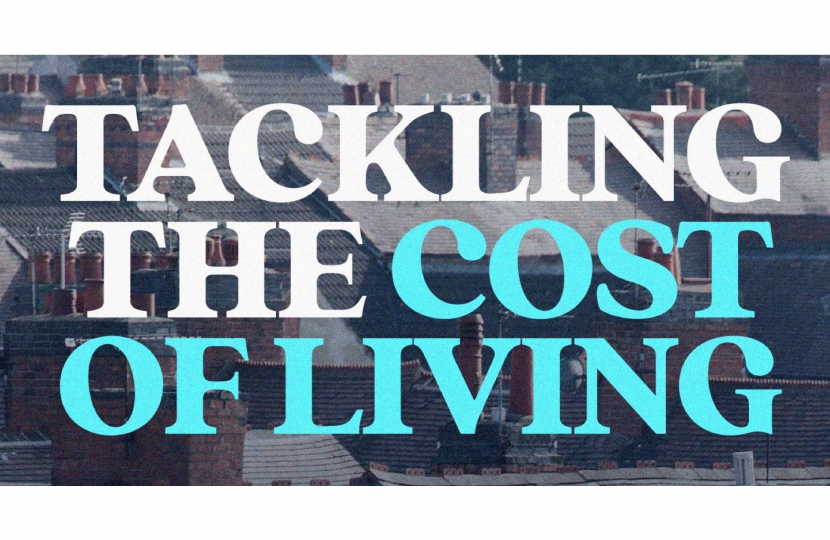
The last few years have been unprecedented – from a pandemic that has severely damaged the global economy to a cost of living challenge now being felt across the world. Due to a series of global forces – economies reopening following the pandemic, Russia’s invasion of Ukraine, and a fresh wave of lockdowns in China – families and businesses are being hit here at home through a significant rise in inflation and therefore everyday prices.

While it is impossible for any government to solve every problem, the priority today is to help the millions of families struggling with the cost of living. The Government is doing this today through a £15 billion package which will support the most vulnerable one-third of households with £1,200 each:
- Raising extra revenues through a new Energy Profits Levy, but without deterring investment
- Providing £9 billion targeted support to the most vulnerable households, including pensioners
- Supporting hard-working families with £6 billion to help with energy bills
The Government is now providing a total of over £37 BILLION of support to help families with the cost of living. This forms part of our plan for a stronger economy – creating jobs, cutting taxes on working people, reducing borrowing and debt, driving businesses to invest and innovate, unleashing a skills revolution, seizing the benefits of Brexit, and levelling up growth throughout the UK.
New Measures Announced…
Raising extra revenues through a new Energy Profits Levy, but without deterring investment:

- A targeted and temporary Energy Profits Levy on profits of oil and gas companies. The new Levy will be charged on profits of oil and gas companies at a rate of 25%, on top of the existing 40% headline rate of corporation tax. It will be temporary, and as the oil and gas price returns to more historically normal levels, the Levy will be automatically phased out. The Levy will be in place from today, and will raise around £5 billion over the next twelve months. The Government is also evaluating the scale of the extraordinary profits made by the electricity generation sector, and considering the appropriate steps to take.

- Significant investment incentives will be built into the new Levy. A new Investment Allowance will double the overall investment relief for oil and gas companies, so companies will have a significant incentive to reinvest their profits. Modelled on the ‘super-deduction’, for every £1 an oil or gas company invests, they will pay 91% less tax – so the more a company invests, the less tax they will pay. And this relief will be available straight away, rather than waiting for profits which is normal for existing investment reliefs.
- Oil and gas companies are currently seeing extraordinary windfall profits due to global spikes in commodity prices, driven in part by Russia’s war. That is why the Government is sympathetic to the argument to tax those profits fairly, as well as incentivising investment.
- Unlike Labour’s windfall tax, this Levy incentivises investment and raises more revenue. The Energy Profits Levy contains an Investment Allowance which doubles the overall investment relief for oil and gas companies – unlike Labour’s proposal. And our Levy raises around £5 billion over the next twelve months, whereas Labour estimates that their windfall tax only raises £2 billion.
Providing £9 billion targeted support to the most vulnerable households, including pensioners:

- £650 cost of living payment for every household on means-tested benefits. This means over 8 million of the most vulnerable households (around one-third of all in the UK) will be directly sent a one-off cash payment of £650, paid out from DWP in two separate instalments, with the first due from July and the second in the Autumn. Payments from HMRC for those on Tax Credits will follow one month later. All those who live in the UK and are in receipt of Universal Credit, Jobseekers Allowance, Employment and Support Allowance, Income Support, Working Tax Credit, Child Tax Credit and Pension Credit are eligible.

- £300 pensioner cost of living payment for every pensioner household in receipt of Winter Fuel Payment. Around 8 million pensioner households already receive Winter Fuel Payments, which we have increased to £300. The Government will send all existing recipients an additional one-off £300 cash payment, due to be paid out automatically in November/December.

- £150 disability cost of living payment for those in receipt of disability benefits. For the nearly 6 million people who receive disability benefits – including Personal Independence Payments, Disability Living Allowance, and Attendance Allowance – there will be an additional one-off cash payment worth £150, paid out from DWP in September. This will help to pay for the higher costs often faced by those who require special equipment in their households.
- £500 million to help hard cases. The Government is providing an additional £500 million for the existing Household Fund from October, to ensure local councils can support those not covered by the above set of payments. Local councils will continue to have discretion over exactly how the funding is used.
Supporting hard-working families with £6 billion to help with energy bills:

- Doubling the October £200 rebate to £400 and turning it into a cash grant. As well as supporting those on the lowest incomes, it is also fair that we help ordinary working families. That is why the initial £200 rebate for every household that the Government announced in February will be doubled to £400 – and we will cancel the existing clawback mechanism, thereby turning it into a £400 cash grant for every household. This will continue to be delivered by energy suppliers from October, with payments spread over six months.
This package will benefit the lowest-income households by £1,200 – with some households receiving £1,650:

- This package equates to £1,200 for those on the lowest incomes – around one-third of all households. The lowest-income households on means-tested benefits will receive £650 from today’s one-off payment, £400 from the energy bills cash grant, and £150 from the council tax rebate – totalling £1,200. For the 8 million most vulnerable households in the country, this £1,200 is comparable to the average energy bill increase over the course of this year.
- Pensioners will receive £850. A pensioner household will receive £300 through the additional Winter Fuel Payment, £400 from the energy bills cash grant and £150 from the council tax rebate – totalling £850.
- Hard-working families will receive £550. Most households will receive £150 from the council tax rebate, along with £400 from the energy bills cash grant – totalling £550.
- Some individuals could receive up to £1,650. A low-income household on pension credit with a disability would receive the £650 one-off payment, £300 through the Winter Fuel Payment, £150 for disability benefit recipients, £400 from the energy bills cash grant, and £150 from the council tax rebate – totalling £1,650.
- Our support to help families with the cost of living now totals over £37 billion. Today’s package of measures provides support worth over £15 billion. Combined with the over £22 billion of support we have already announced, the Government is supporting families with over £37 billion – or 1.6% of GDP, similar/higher than France, Germany, Italy and Japan. Over three-quarters of our support will go to the most vulnerable households – including pensioners.
- Next year, the Government anticipates benefits will be uprated by this September’s CPI, which is likely to be significantly higher than the forecast inflation rate for next year.
- The one-off cash payments to benefits recipients and pensioners will be delivered UK-wide, for which we will legislate for Northern Ireland. The Government is determining the best way to ensure people in Northern Ireland will benefit from the £400 cash grant for energy bills (£165 million of Barnett). The £500 million Household Support Fund is England-only and will attract Barnett consequentials in the usual way (Scotland £41 million; Wales £25 million; Northern Ireland £14 million).
